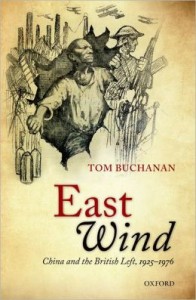Review: The road to China
 This review appeared in the 34th issue of the newsletter of the International Brigade Memorial Trust and is reprinted here with the IBMT’s permission.
This review appeared in the 34th issue of the newsletter of the International Brigade Memorial Trust and is reprinted here with the IBMT’s permission.
Tom Buchanan. East Wind: China and the British Left, 1925-1976 (Oxford University Press, 2012); “Shanghai-Madrid Axis’? Comparing British Responses to the Conflicts in Spain and China, 1936-39”, Contemporary European History 21.4 (November 2012): pp 533-552.
Tom Buchanan’s capacity for detailed research is put to excellent use in his latest book, East Wind, and in a fascinating article on the existence of a Shanghao-nadrid Axis” in the period 1936-39, certain to be of particular interest to IBMT members for its numerous insights into this long-neglected subject. Both the book and the article contain references to those who went to China after having been in Spain during the civil war, including familiar names such as Nan Green and David Crook.
Buchanan gives due acknowledgement to Arthur Clegg for having documented the work done by the China Campaign Committee in solidarity with the Chinese against Japanese aggression (Aid China, 1937-1949: A memoir of a forgotten campaign; New World Press, Beijing, 1989). In East Wind, Buchanan explores the wider subject of the intricate relationship between China and the British Left, giving a much-needed analysis of the period from the rise of modern Chinese nationalism to the death of Mao Tse-tung. Reactions in Britain to the wars being fought in Spain and China form part of this ground-breaking study. The failures of British foreign policy are brought into stark focus in one of the illustrations, namely the New Leader’s graphic depiction of warplanes in V formations labelled“Spain”,“China”,“Abyssinia” and“Czechoslovakia”, flying over Britain in 1940 and captioned with the Chinese ambassador’s comment,“the air is black with the wings of chickens coming home to roost”. Drawing on many such apposite quotations, and with a notably extensive bibliography,East Wind will appeal to anyone with an interest in the history of the Left, and will surely become a definitive reference work for students in years to come.
In the article,“‘Shanghai-Madrid Axis’?”, Buchanan’s focus is specifically on a comparison between the campaigns in Britain to support the Spanish Republic and those to aid China in the period 1936-39. For a brief time, these campaigns were at the forefront of attention among left-wing activists, particularly following the bombing of civilians in both countries in 1937. The strong links between the two causes are evident. Some former Brigaders, like Patience Darton, went on to work in China, though in her case not until the 1950s. In 1939, still raw from the defeat Spanish Republic, she had tried to go there with a group of doctors she had met in Spain, but had been unsuccessful. In this period before the outbreak of World War Two, she and others who had worked together in the Brigades believed that China offered a new front in the fight against fascism and the chance to build a better world. Buchanan’s article sets out the context for such a transference of hope.
Though the conflicts were frequently presented in similar terms as“fascist assaults”and “people’s wars”, Buchanan examines why China never became“China”, a“great cause”like that of“Spain”, instantly recognisable from one emotionally charged word. His skillful in-depth analysis of the cultural context and the involvement of key writers and intellectuals of the times give a new and welcome perspective on the interconnections between the two campaigns.
Angela Jackson’s latest book is “For Us It Was Heaven”: The Passion, Grief and Fortitude of Patience Darton (Sussex Academic Press, 2012), a biography of the International Brigade Nurse who lived in China from 1954 till 1958.












